Project activities are progressing fruitfully: tasks from Work Package 2 have led to the development of a sustainable feeding program for pilot activities. It is a key milestone of the activities, as the sustainable diets will be the mainstream of the sustainability of the sector.
The development of a methodology for the development of sustainable feeding programs for the aviculture sector and the proposal of preliminary diets to be used in pilot project activities are two main objectives of the SUSTAvianFEED project.
The resulting preliminary diets proposal reduces consistently the environmental impact of diets, the presence of imported products, and perfectly satisfies the nutritional characteristics of the animals for a satisfactory growth and performance.
All these aspects revealed that the transition towards a more sustainable aviculture sector is possible and, considering the moments we are living, should be a must for our world.
The methodology
The methodology has been defined with the different steps followed during task development and which can be exploited to other context and farming sectors, beyond the aviculture one.
The first step followed has been the development of a usual ingredients list to be contemplated for the elaboration of the diets. In this step, the first set of Living Lab activities has taken place, in order to gain knowledge with from external actors. These activities have offered relevant and quality results which were contemplated in the diets proposals.
Then, the study of nutritional composition of the different ingredients proposed have been studied by using relevant bibliography as well as conducting some analysis when information was missing. This, together with the specification of the nutritional requirements of each pilot project, has led to the definition of the initial preliminary diets, proposed by each partner and which have been the basis for the whole task development.
These initial preliminary diets have been refined by several activities done:
- Internal evaluation of the initial preliminary diets made by ALIA and UMU.
- Feed safety and health evaluation of the diet (task 2.3).
- Environmental evaluation of the diet (task 2.4).
- Nutritional evaluation of the diet (task 2.5).
- Diet validation by external actors in the framework of LL activities (task 4.1).
After studying all these inputs, the sustainable feeding program has been proposed. Nevertheless, it should be considered as a proposal, as due to availability of ingredients for the project start and the nutritional characterization of insects and other ingredients, the sustainable program may have some deviations, although the methodology will be always followed as indicated. Moreover, due to the variability of the prices at this moment, some adaptations could be done during pilots’ development.
Sustainable feeding programs
All the sustainable feeding programs proposed perfectly satisfy the nutritional requirements of the animals, while achieving project objectives in terms of reduction of the environmental inputs, included of by-products and alternatives ingredients and reduction of imported ingredients.
The proposed diets reduce the environmental impact from the 17% (the most conservative one to the 50% (the most ambitious one).
As it has been studied, there is a great number of possibilities which can increase the sustainability of the feed production and, consequently, the aviculture sector.
During this phase, it has been remarked the importance of the nutritional characterization of the diets, as well as the crucial step of the environmental evaluation by using the appropriate Life Cycle Assessment (LCA) methods.
In addition, the sustainable feeding program includes a feed safety and health evaluation so potential risks are avoided.
On the other hand, the importance of the external actor’s engagement has been highlighted. With the two sets of activities developed in the framework of living labs, relevant insights have been obtained for the project itself and for future activities in an exploitation phase.
The preliminary diets proposal for pilot implementation reduces consistently the environmental impact of diets, the presence of imported products and which perfectly satisfies the nutritional characteristics of the animals for a satisfactory growth. All these aspects revealed that the transition towards a more sustainable aviculture sector is possible and, considering the moments we are living, should be a must for our world.
The climate change is already a reality, Mediterranean countries are suffering its effects dramatically and this is expected to be increased in the future. In addition, the social perspective also makes it important to mention that those who contribute the less to climate change are the ones which suffer the most its effects.
The farming sector is one of the main contributors to climate change, so it is crucial that new food chains are environmentally friendly, foster local economies and consider social aspects and feed production will be the mainstream of this change.
It is time to act, and SUSTAvianFEED propose a tangible approach for this which will be complemented by results in the following project activities.
Quality of the diet
The main conclusion by partners regarding the quality of the alternative diets are

Reduction of the use of soybean/imported cereals
The reduction of imported ingredients, especially soybean, has been another important topic addressed. The main conclusions obtained from this topic are
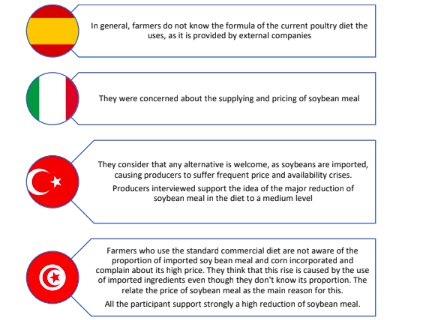
Alternative ingredients and by-products
When discussing about the alternative ingredients and by-products that the alternative diets included, there were new suggestions for adding new ingredients in many occasions. In addition, some other comments were added as it is shown here
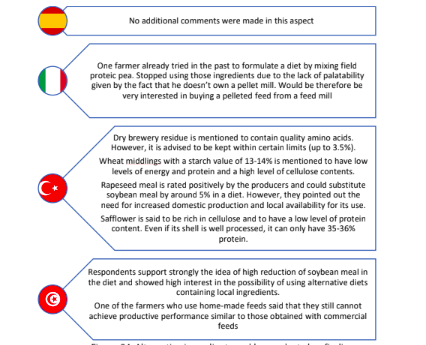
Sustainability
The sustainability is without any doubt the main pillar of the project. In that sense, it is also important to know the environmental concern of farmers and other stakeholders in this aspect. The main feedback obtained is explained here
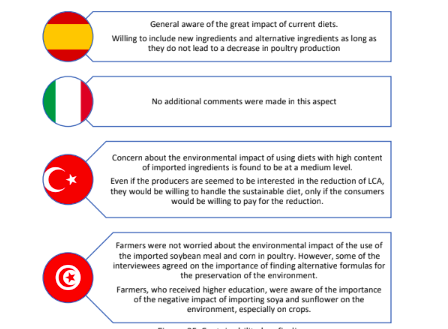
Cost/Profitability
The profitability is, on many occasions, a critical point for the farmers and other actors of the supply chain. The loss of competitiveness or the no willingness of the consumers of paying more for sustainable products are some of the most important aspects mentioned. The summary of all of them are
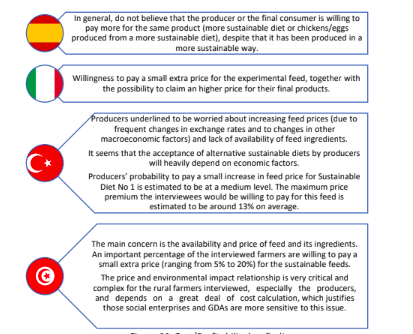
Use of insects
The use of insects, one of the most important innovations of SUSTAvianFEED approach, has attracted a lot of interest from the participants because of the possibilities its use arises. Some of the key aspects mentioned about them are listed here
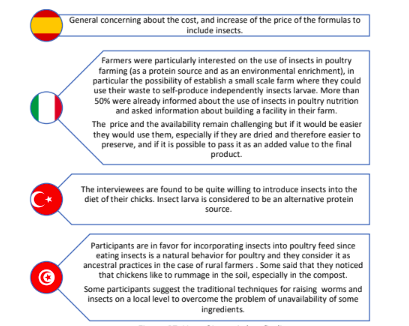

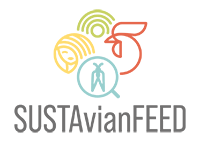





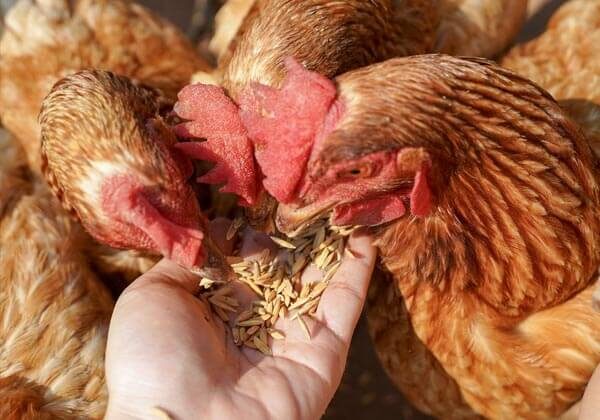
Leave a Reply
You must be logged in to post a comment.